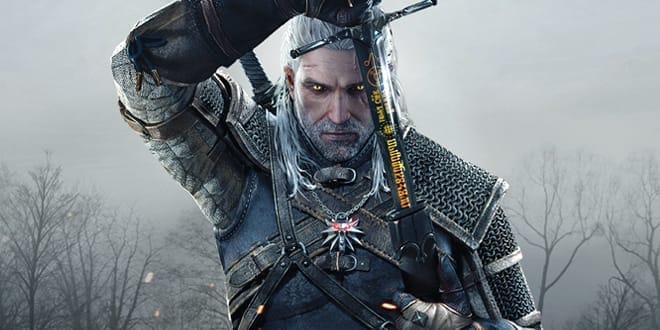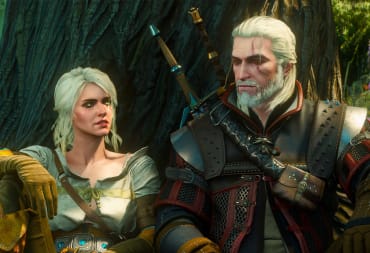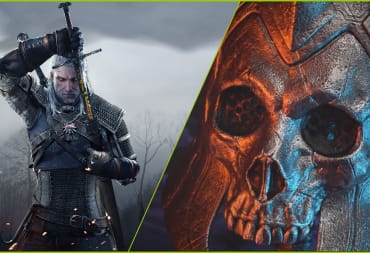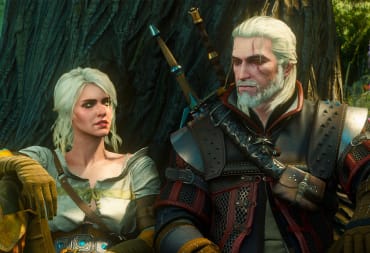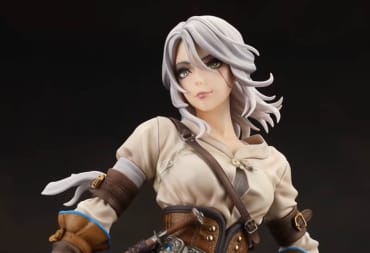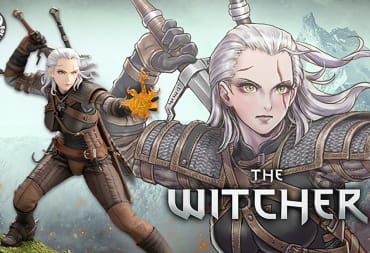It would be a great understatement to call The Witcher 3: Wild Hunt a good RPG. While The Witcher 3 is light on outright innovations in the genre, it often twists and subverts expectations, executing almost everything near perfectly. So no, The Witcher 3 is not simply a good RPG, it's a milestone.
From the outset, as outlined by Don Parsons, The Witcher 3 sets itself up as something greater. It’s not the most explosive or tantalizing beginning, but it is so well-crafted and detailed that it would be hard to do it better. That craft and detail is what defines the game, as that is where The Witcher 3 shines.
As I took so long to get to it before, let’s talk about combat first. The Witcher 2’s combat was difficult to just get competent at and was relatively unrefined in a sort of clunky way. Certain things were broke, like dodging and the Quen sign, making the combat difficult to handle overall.
The Witcher 3’s combat is full of flair and spectacle, with some much-needed improvements and additions. Simply updating Geralt’s movement during combat has done wonders for the game. The ability to choose a direction to simply dodge, on top of the ability to roll away, has made The Witcher 3’s combat feel refreshing and tense.
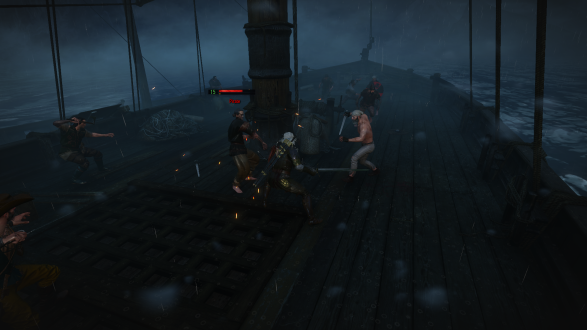
The counter system works both in and against your favor. Even early in the game you will not get away with just slashing over and over again at an enemy. Eventually, they will tire of it, and quickly too, countering your move and forcing you to retreat.
Geralt's abilities stay mostly the same throughout The Witcher 3. You can put Ability Points into certain areas as you level up, some of which will offer little changes in how certain things work. For example, you can add a spin attack that damages enemies around you, the Igni sign can be changed from a quick blast of fire to a continuous stream, and the Aard sign can be changed from a quick blast of force to an outward one in all directions.
For the most part though, what you start with Geralt will be what you end with. That's not necessarily a bad thing, as the combat is engaging enough to keep you coming back, particularly considering the many different ways that you'll need to approach enemies as you go forward. The Witcher 3 does not attempt to overwhelm or do too much in the combat, but giving you a set of tools to work with that you then have to adapt to whatever you are facing.
The variety in enemies is rather astounding as well. Not just in their aesthetic, but in the gameplay. For the most part, the human enemies are pretty much the same except for the small variety added by giving them a big two-handed axe or shield, as well as the occasional ranged enemy with a bow or crossbow.
The vast array of monsters, spectres, vampires, etc. add a lot to the gameplay. Most of this is done through Contracts, which are quests where someone will pay Geralt to take care of a monster. Each one will send you to something unique, and often to something you have never encountered and may not again.
Each monster has their own strengths and weaknesses, which you can read more about in the Beastiary. Knowing which bombs, spells to use, oils. and anything else is part of the puzzle in defeating a monster. Most have their own unique movement, react to your attacks differently, counter in their own way, and have their own special abilities as well.
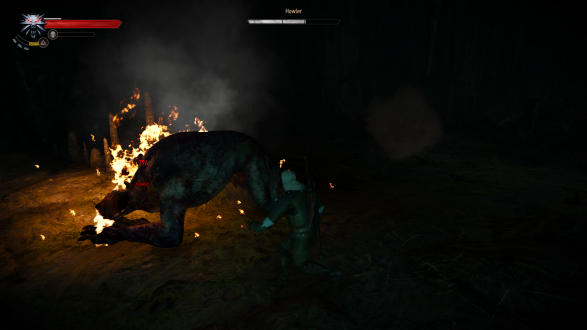
Many of the same types, like spectres or beasts, will have some thread of similarity throughout them, but for the most part, each monster is wildly different than the previous. Fighting these monsters in the Contracts is easily one of the game's greatest strengths. Some may find them to simply be “go kill that thing” quests, but there is always more substance attached to them, which is a key design element of Witcher 3, utilizing throwaway elements to build a world and craft a story.
Many of the Contracts have a small story attached — like a murder, forbidden love, betrayal, etc. — and offer a lot to learn about the world and the monsters that inhabit them. Each starts with its own investigation by usually questioning various townsfolk who may have seen the monster for Geralt to try to learn what it is exactly, as he is the only one who knows their proper name.
From there you use your Witcher Senses, which is similar to Eagle Vision in Assassin’s Creed, to usually follow the trail of the said monster. Geralt doesn’t always kill whatever he finds, though that is usually how it ends. And they don’t always lead to monsters. Some may grumble at the Witcher Sense as being a contrived way to make quests simpler. Witcher Senses, to me, are nothing more than the game allowing us to see things through Geralt’s eyes. Geralt is an established character, with a long background and particular set of skills. Witcher Senses are a glimpse into that.
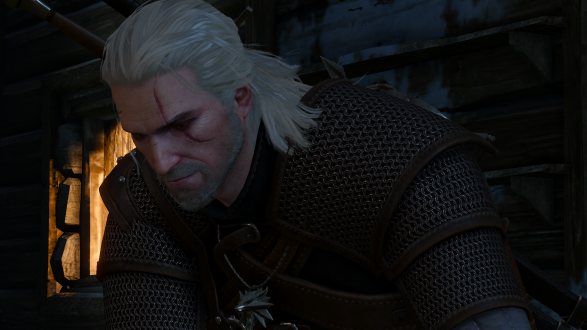
One of the key elements to The Witcher 3 is that everything revolves around Geralt. The player uses Geralt’s knowledge and abilities to track down the monsters in Contracts, it is Geralt who chooses the words in his dialogue, and ultimately, even though many decisions have many options, it is left to Geralt. The dialogue and story options all match up with his established character and can be justified by his past or personality.
The Witcher 3 may offer you the opportunity to kill or let someone live, but they are for Geralt’s reasons. That doesn’t mean you aren’t playing some part in the story, as your decisions do have great consequences plenty of times. You're the one setting the tone and deciding which way Geralt leans, but it is still ultimately Geralt giving you the options to choose from. Most of these decisions are difficult, have unforeseen effects, and may even crop up in other quests down the line. You're often unaware of the power of those decisions until later down the line.
This frees The Witcher 3 from a narrative that many games get trapped behind due to the nameless/silent protagonist. Instead of trying to make you great or create some kind of origin story, The Witcher 3 already knows how cool Geralt is and is free to let him roam through a great variety of narratives, while not having to leave so much open ended for player choice. Instead, The Witcher 3 is allowed to craft something with all the pieces known and clear direction. In some ways, the game gets the best of both worlds in terms of linear storytelling and player choice.
That has allowed for stronger, focused narratives within their quests. And there is some sort of narrative attached to every quest. I honestly can’t think of any fetch quests or “kill X amount” quests in the whole game. The closest are the Contracts and even they have some investigating to go along with it. Geralt at points is involved in all sorts of narratives — solving murders, putting on a play, aiding in assassinations, aiding in elaborate escape plans, solving the mystery of a heist, and even finding a pan for some lady.
Another great part of many narratives within The Witcher 3 is that they involve points and devices based around things in the world. For example, there is something called a "doppler" in The Witcher 3 that can change its form to look like anyone else. Well, one part of the game relies on finding that doppler to use his abilities in rescuing one of Geralt's friends.
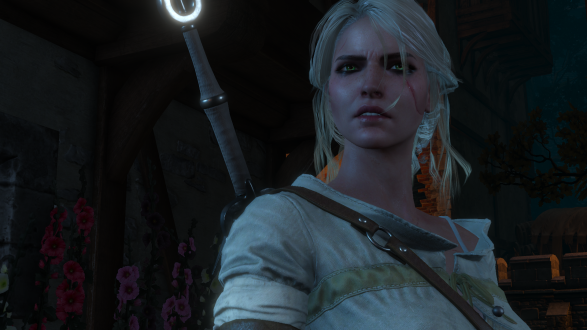
The narrative of the main plot is excellent as well. The intense relationship between Geralt and Ciri is the driving force, with a mix of political intrigue as a war is going on, along with some of the fantastical in The Wild Hunt's endless pursuit. I'd rather not go into detail other than to say that it the main story will consistently create questions in your mind providing continuous hooks to keep you interested. The Witcher 3 takes the hydra approach in that it seems that for every question answered, two more will pop up.
While discussing the writing, I'd be remiss to not mention the dialogue. The contemporary dialogue mixed in with the world does wonders for the setting and leads to many hilarious moments. There's just something about Geralt saying, "Thanks bunches," in reply to someone that makes me laugh. There are many witty remarks to be found and even more colorful insults. The dialogue did well for the characterization, and there was nowhere it seemed out of place, considering the contemporary language was well-established. It probably helps that the voice acting was top notch as well.
A small detail to note is in the animation of the face while characters are talking, particularly Geralt. They still don't look 100% natural, but the little touches like the cheeks puffing out slighlty on "puh" and "buh" sounds adds more than you'd think and in a subtle way. That sort of small detail evidences the rather great animations you'll find throughout.
The Witcher 3 is rather grim and many of the decisions you will make only vary in their shade of grey. You may help reunite two lovers, but you may be bringing one of them in a bag of bones. You may solve the murder, but only to explain to the questgiver that it was her husband that killed her brother.
And is there something sinister about a bag of bones? In one case there most certainly was, as I brought back his love's bones and walked out the door to hear his screams as I was walking away. Rushing back in, I barely glimpsed a spectre running off, leaving her love behind covered in blood.
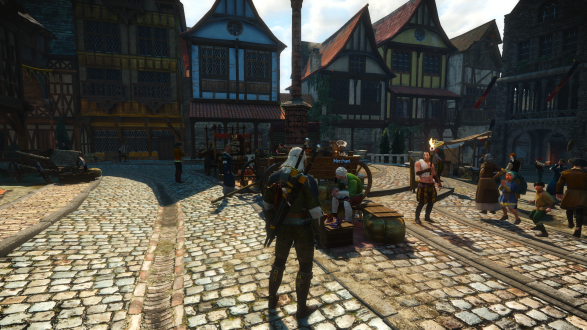
That is the world of The Witcher 3. Everything has a price and nothing is really clear cut. You may feel inclined to help out a friend, but that may only lead to a disagreement ending in their death There may be a few cases of something being a truly good or bad decision, but I can't think of any. Everything has a give or take, from Geralt, to kings, to peasants. Each has some problem that may or may not be solved and almost never is in the way they intended.
The Witcher 3's world is massive too, with many opportunities for exploration. Aside from the many side quests and narratives, there are plenty of reasons to just go wander in the countryside or hop in a boat and look around. You can find bandit camps, save someone that has been kidnapped, explore caves full of monsters, find buried treasure, follow a trail of notes to treasure, and a lot more. Exploring will often lead you to many quests as well, like figuring out the mystery behind an abandoned village overrun with monsters.
The exploration becomes even more compelling when you choose not to have the game guide you by turning off the minimap and other directions. Every quest will give you directions like "go West until you hit the lake, turn until you find the big rock and then head into the trees." You can use the guiding system if you'd like, or you can try and figure it out for yourself, which will really help engage you in the world. This is also great for randomly stumbling onto something out in the world as you guide yourself with nothing but the map.
One of the great things about the exploration is the lack of cookie cutter designs. Many of the caves you explore will be unique and often geared towards whatever resides inside. That is also true for buildings throughout The Witcher 3. Obviously, some of the smaller ones will be similar, as they are simply just four walls, but you'll still be hard-pressed to find others with more complex designs sharing similar layouts. Taverns have a wide range from massive three story buildings filled with dark wood, to small ones with just a few tables and some planks for walls. The only similarity, again, you may find is in the simpler taverns that have little to work with. For the most part though, everything you run into will be unique.
If you ever get tired of exploration you can take a break with the some of the "minigames" in addition to side quests and Contracts. There is Gwent, a simple to learn card game with a surprising amount of strategy behind it. Gwent also serves as The Witcher 3's collectibles, as you can find/win cards all around the world. There's also the standard brawling, which is more of a side quest, that has become a staple in The Witcher series. Finally, you can go race your horse, Roach, as well if you'd like.
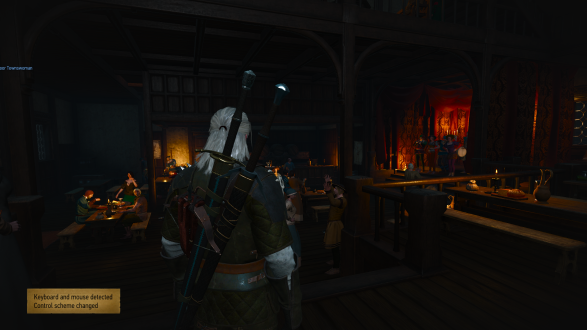
The overall design of The Witcher 3 is a sight to behold as well. From the unique and varied armor designs, to the personal touches within taverns, to the swaying trees in a forested area (sometimes there is too much swaying). The enemies are distinct too, each with their own oddities and movement in their animation. Even many of the humans have a unique design, particularly those within Novigrad that are part of the various gangs.
Those that have complained about the graphical "downgrade," may be right in that it could have been changed. However, what remains is still one of the most impressive looking games out there at the moment. Even, as I said in my first impressions, The Witcher 3 looks amazing at lower settings.
Most of it is high quality, and while aesthetic is relatively subjective, everything makes sense together. The poorer parts look rundown, the rich parts of town look lavish, and the forest is full of varied trees and other plants. More than that though, The Witcher 3 has a distinct feel to it that is informed through the aesthetic, from the choice in how certain trees look to the various designs of what NPCs wear. It's not simply that certain areas look as they should, but that they all have a distinct Witcher feel that is hard to place.
Speaking of gear, there is a lot of it in The Witcher 3. From random drops of gear to crafted, there is plenty of choice. You'll have your basic gear with names we've all heard before like "Tracker Pants," but every once in a while you may run across something with an odd sounding name — The Witcher 3's relative equivalent to a "legendary" in other games.
What you should spend most of your time gathering are the sets you can find based on the various Witcher schools like Cat, Wolf, Bear, etc. Each of them have a theme in abilities/playstyle. For example, one will focus on increasing the effectiveness of Signs and allowing you to use them more often, while another may be concerned with protecting you from piercing, bludgeoning, and other types of damage.
The sets can be upgraded a few times, but each time you have to find a new set of diagrams to upgrade. These offer neat little diversions that force you to go to different places in the world, each of which will usually have a fight with a monster similar to the school's set that you are attempting to find.
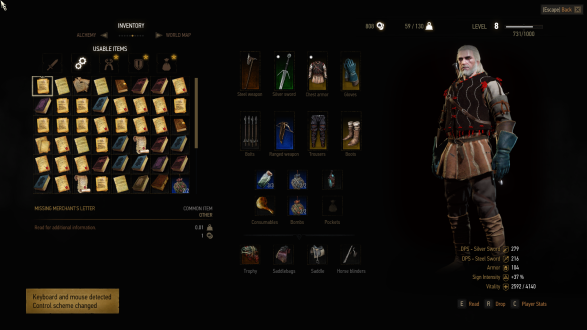
Crafting in The Witcher 3 is standard for most RPGs. You have to go find the plans before you can have certain things made and only certain monsters will drop the materials you need for some gear. You'll have to make sure to find the different armorers and blacksmiths though, as some of them have more skill, which is a requirement to craft some pieces of gear. Be prepared to collect a lot of plants along the way too, as they are everywhere and you'll need a large variety for crafting and alchemy.
The big improvement in crafting comes in alchemy. You find the formulas for the different potions, oils, etc. but you only have to make them once. They have a limited charge, but they will get replenished whenever you meditate (meditate is where you can pass time and on lower difficulties will heal you) if you have some alcohol on you to replenish it.
That brings me to a small gripe I have with the inventory system. It is only broken into a few categories where everything is thrown together. It's hard to navigate as your inventory will fill up quickly with a huge variety of items, the most annoying of which being the many notes you will find. The Witcher 2's was arguably better, as it was more organized. There may have been more menus to go through, but at least it was easier to find what you were looking for. Though, it is not as if The Witcher 3 fills your bags with useless stuff, as most of it will have some use in alchemy or other areas. You can even break down/craft those items into something else if you need.
There are a few other small issues I have as well. Moving Geralt around in fine spaces can be difficult. The tiny movements that require a lighter touch aren't really there, which made it more difficult sometimes to get where I wanted to be. Which is directly related to another problem, that of the difficulty in finding the correct angle when looking at something like a crate to loot it.
Also, atmosphere in some of the villages can be broken by the repetitious dialogue. In some villages, NPCs will say the exact same thing as you go by every time. This is only a minor problem found a few times in the world, as for the most part there is a good variety, particularly in Novigrad.
That brings us to the sound, which is something I usually don't notice in a lot of games, but I've found certain songs stuck in my head this past week, only to realize when I started up The Witcher 3 again that they were from there. The soundtrack adds to the epicness when it needs to and really gets the blood pumping during combat. If I knew more about music I'd have more to say, but I will say that there weren't any standout moments to me where the music didn't fit.
Instead of rehashing it, my feelings towards the scale of the world, some more on leveling up, some other thoughts on the combat difficulty, and some more on the graphics, check out my first impressions. Those are still true today.
In the end, The Witcher 3 can't be described as a good or even great game; it is one of those pivotal moments in gaming that people will debate the significance of for a long time. As of now, it is clear to me that The Witcher 3 is the new benchmark that all open-world RPGs should strive for. If other developers do try and take some cues from CD Projekt RED, in both game design and fan interaction, the gaming world would be a much better place.
The reviewer was provided a copy of The Witcher 3 and it was reviewed on the PC with a controller.
Review Summary
Pros
- Intricate and Beautiful World
- Quality Writing in Even the Smallest Interactions and Quests
- Memorable Characters, Geralt in Particular an Achievement
Cons
- Clunky inventory system
- Finer movements in small spaces can be difficult
Have a tip, or want to point out something we missed? Leave a Comment or e-mail us at tips@techraptor.net
